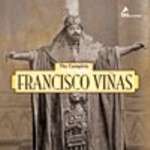The Catalan tenor Francisco Viñas (1863-1933) was a major presence on the international opera circuit in the years before World War I. (Collectors may be more familiar with the Italian version of his name, Francesco Vignas). This set includes his entire known recorded legacy–68 opera arias and art songs made between 1903 and 1912–on three CDs, the shortest of which runs to 78 minutes. The dates will tell you that the sound ranges from primitive to just acceptable, but Marston’s expert transfers manage to capture Viñas’ timbre and to convey the brilliance of his high notes while avoiding the pitch fluctuations that so often make recordings of the period something of a listening trial.
Viñas was trained in the Italian bel canto school already giving way to the more muscular verismo style of singing. So we hear a bright, open timbre, clear diction, little vibrato, masterful legato, and an abundance of portamento, among other stylistic aspects that include what modern ears may interpret as emotional understatement and a lack of detail. We also hear extended vowels that aid in projecting his trumpet-like top range, and phrases taken in long spans indicating his excellent breath control.
An eminent Wagnerian, Viñas sings the 26 tracks devoted to the composer in Italian; the combination of bel canto style and the substitution of liquid Italian text for the gutteral consonants of German produces a softer, gentler Wagnerian style, though never lacking in emotional punch. Viñas’ noble “Rome Narrative” from Tannhäuser is a case in point, the opening affecting in his darkened tone, the account of the confrontation with the Pope thrilling. Arias from Lohengrin feature plangent timbre, long phrases, and upward and downward portamentos that helped make this his signature role.
His technical mastery is obvious in a 1905 “Celeste Aida”, with its spectacular graded diminuendo on a soft F, while the brilliance of his ringing top is apparent in such items as the arias from Un Ballo in Maschera and in Mascagni’s song, “Serenata”. Other highlights include his declamatory delivery in an aria from Mascheroni’s Lorenza, the mastery of line and the warmth of his “Allmächt’ger Vater” from Wagner’s Rienzi, and the radiance of one of his most popular recordings, “Pour Berta” from Meyerbeer’s Le Prophète. The arias, many of them duplicated in different recording sessions, are leavened with Spanish and Italian songs sung with polished finesse, rhythmic bounce, and evident enjoyment. This important set is available from marstonrecords.com. Vocalistas won’t need further urging.
































